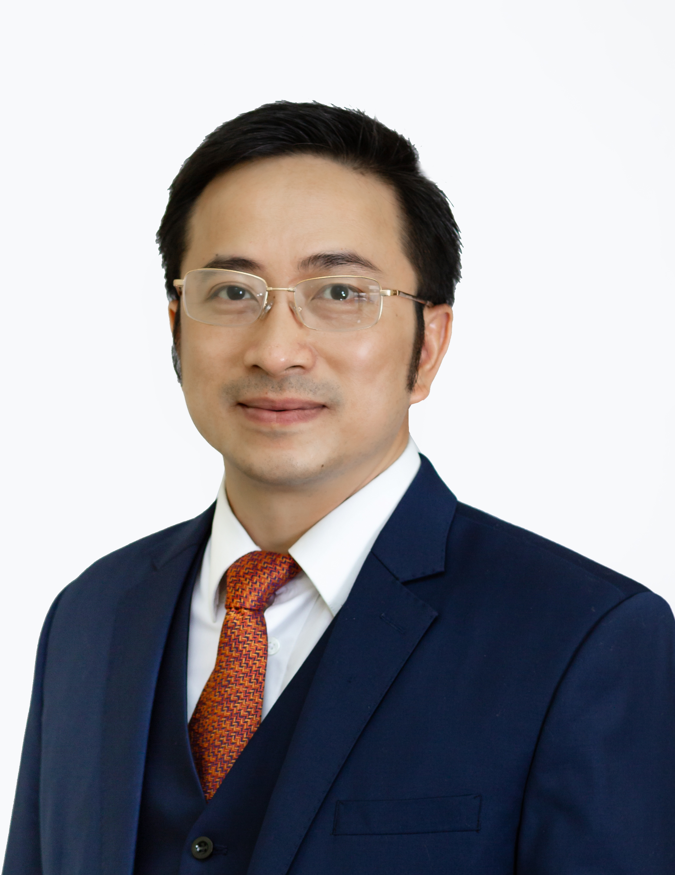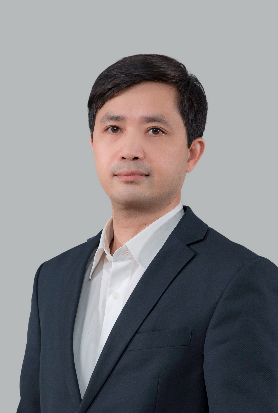Keynote Speakers

Assoc. Prof. Dr. Minh T. Nguyen
Thai Nguyen University, Vietnam
Minh T. Nguyen received his B.S., M.S. and PhD degrees in Electrical Engineering from Hanoi University of Communication and Transport, Hanoi, Vietnam in 2001, Military Technical Academy, Hanoi, Vietnam in 2007, Oklahoma State University, Stillwater, OK, USA, in 2015, respectively. Associate Prof. Dr. Minh T. Nguyen is currently the Director of Human Resource Training and Development center (HDC) at Thai Nguyen University (TNU), Viet Nam, and the director of Advanced Wireless Communication Networks (AWCN) Lab. He has interest and expertise in a variety of research topics in telecommunications, computer networking, and signal processing areas, especially compressive sensing, and wireless/mobile sensor/ robotic networks. He serves as technical reviewers for several prestigious journals and international conferences. He also serves as Editors for some journals as, Wireless Communication and Mobile Computing, Transactions on Industrial Networks and Intelligent Systems and Editor in Chief for ICSES Transactions on Computer Networks and Communications.
Unmanned Aerial Vehicles (UAVs) for Remote Sensing: Applications, Technical Problems and Research Orientations
Abstract: Over the past few decades, remote sensing has established itself as an effective technique for monitoring and data collection across several industries, weather conditions, and geographic locations. UAV technologies have demonstrated their distinct benefits in a variety of remote sensing applications, including precision agriculture, forestry, power transmission lines, buildings, artificial objects, and natural surroundings. UAV remote sensing techniques can be used in precise ground object identification and detection.
This talk considers UAV sensing networks that comprise hardware and networking techniques. The networks' data collecting algorithms are discussed. Advanced data processing methods for networks are also offered. Some control algorithms for deploying and maneuvering the UAVs in such networks are proposed and evaluated. The issues with the UAVs' energy efficiency are discussed and resolved. The presentation will offer some prospective areas for either future developments or research collaborations.

Assoc. Prof. Dr. Chi Nguyen Van
Thai Nguyen University of Technology-Thai Nguyen University, Vietnam
Chi Nguyen Van received his B.S degree in Instrument and Control Engineering from Thai Nguyen University, Viet Nam, in 2000; M.S. and Ph.D. degrees in Automation and Control Engineering from Hanoi University of Technology and Science, Hanoi, Vietnam in 2006, and 2012, respectively. Assoc. Prof. Dr. Chi Nguyen Van is currently the Head of the Faculty of Electronic Engineering at Thai Nguyen University of Technology (TNUT), Viet Nam, and a researcher of the Dynamic and Control Lab. His research interests include nonlinear control, adaptive control, optimal control, and system identification for Energy Storage System using lithium-ion batteries and dynamic process systems. He serves as a technical reviewer for several prestigious journals and international conferences.
State-of-Charge Estimation of Lithium–Ion Battery Using a Long Short-Term Memory Network
Abstract: Improving the accuracy of state-of-charge (SOC) estimates is essential in electric vehicles using Lithium-Ion batteries, helping users to reliably predict the driving range and control the optimal charging process in order to prolong lifespan and ensure safety during use. However, due to the temperature, and charge-dependent electrochemical nonlinear dynamic of Li-ion batteries, SOC estimation remains a significant technical challenge today. Traditional SOC estimation methods such as the filters, require the cell’s exact model with pre-determined electrochemical characterizations, and filter design and parameter tuning that must be specified to each battery type. In contrast, neural networks are data-driven approaches that require minimal knowledge about the nonlinear dynamics of battery. To help solve this problem, this work proposes a method to solve SOC estimation using a Long Short-Term Memory (LSTM) network that is capable of remembering battery characteristics related to electrochemical parameters changes during the long term, as the number of discharge cycles and the effects of aging increase. The methodology includes data preparation, LSTM network model development, LSTM network configuration tuning, and robust validation of the LSTM against measurement noise. This method is tested to estimate SOC with data collected through the testing data of 3Ah LG HG2 cell, SOC estimation results are also compared with feedforward neural network (FNN) and convolutional neural network (CNN) shows that SOC estimation accuracy of 1% root mean square error.
Invited Speaker

Assoc. Prof. Souad Bezzaoucha Rebaï
EIGSI - La Rochelle, MIA Laboratory, France
Souad Bezzaoucha Rebaï graduated from Ecole Nationale Polytechnique, Algeria, where she received an Engineer Diploma in Automation Control (Valedictorian with highest class) and a Master of Science in Electrical Engineering in 2005 and 2007, respectively. She received a Master degree in Computer Science Engineering from Ecole Polytechnique, France in 2010 (Excellence Scholarships from the Foundation of Ecole Polytechnique) and spent one year from 2007 to 2008 as a research student at the Graduate School of Engineering, Kyoto University, Japan (Japanese Government- Monbukagakusho Scholarship). She received her PhD from Université de Lorraine, France, in 2013. From January 2014 to May 2015 she was a postdoctoral fellow and lecturer at Laboratoire de l’Intégration du Matériau au Système (IMS), Bordeaux, France and Bordeaux Polytechnic National Institute (INP) Enseirb-MatMeca. From June 2015 to May 2020 she was a Research Associate at the Interdisciplinary Center for Security, Reliability and Trust (SnT), University of Luxembourg, where she worked on various robotic and cyber-security projects. Since March 2021 she was appointed as Associate Professor at EIGSI-La Rochelle and she is attached to the MIA laboratory- La Rochelle University as associate researcher since Jan 2023. Her research interests are in robust control theory, observers design, nonlinear Systems, robotics and cyber security.
Advanced Polytopic Observer and Robust Control Design for cyber-Physical Systems
Abstract: The sector nonlinear approach is a useful method allowing for an exact polytopic representation of a system with a nonlinear behaviour. Once the model has been redefined in a polytopic form, one has to choose the right control structure. This talk considers the control design of CPSs (Cyber Physical Systems) and particularly control methods that are robust against attacks in the model, attenuating their effect and ensuring at the same time a reliable state and attacks estimation allowing their detection and isolation while maintaining the system stability, integrity and performances. The considered approach is based on the Lyapunov theory and LMI resolution approach in order to deduce the observers-controller gains. An algorithm based on a robust polytopic controller ensuring the asymptotic stability despite data deception attacks and external perturbations attenuation guaranteed by the norm will be given. In order to illustrate the proposed approach, numerical examples will be given.
